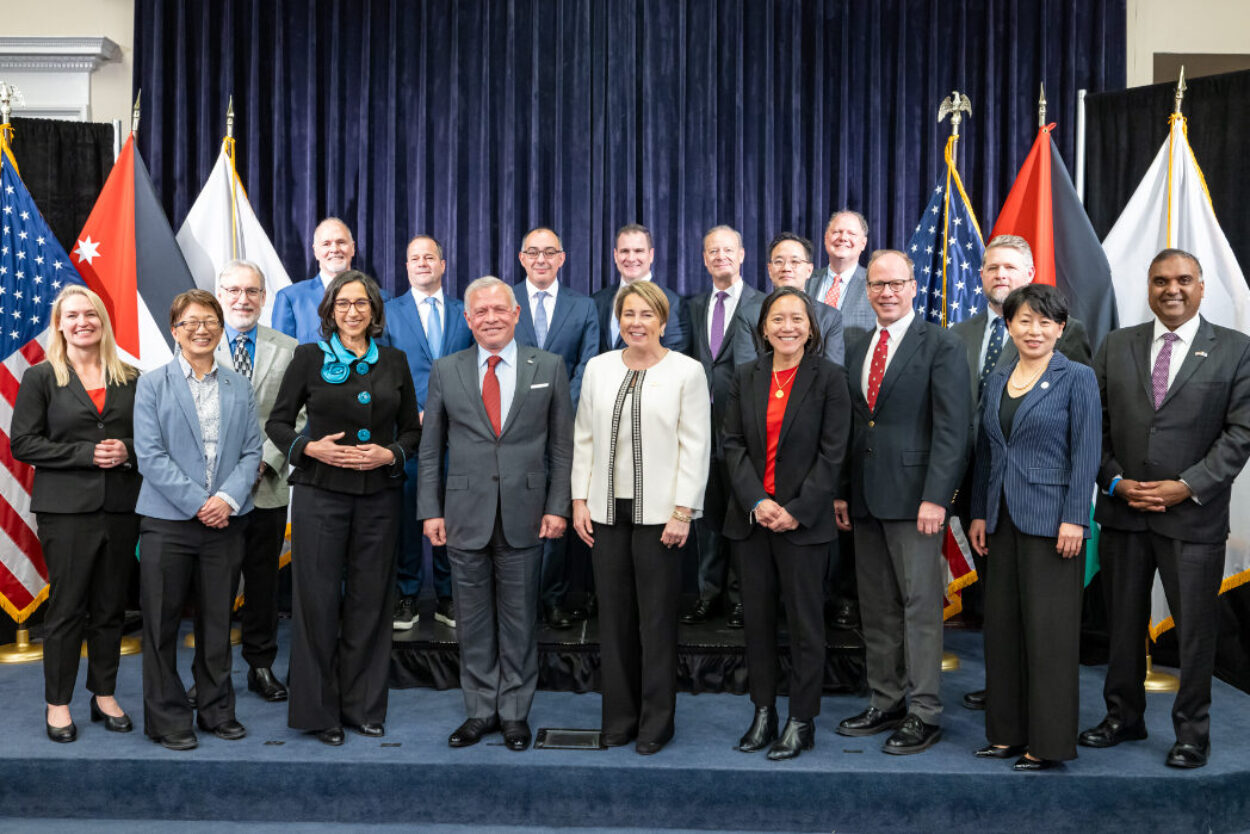MIT took steps to strengthen its bonds with the Kingdom of Jordan on February 10, as Vice Provost for International Activities Duane Boning joined more than a dozen leaders of Massachusetts’ marquee industries and institutions for a State House roundtable discussion with His Majesty King Abdullah II ibn Al Hussein.
Moderated by Governor Maura Healey, the roundtable was a forum for leaders in the fields of higher education and research, life sciences and health care, technology and advanced manufacturing, and financial services and trade to discuss ways to bolster economic ties. In a statement after her meeting with His Majesty King Abdullah II, Healey noted “the longstanding friendship and partnership between Jordan and Massachusetts,” which in 2023 exported $7.3 million in goods to Jordan and imported Jordanian goods worth $15.3 million.
“We were grateful for the opportunity to connect His Majesty with many of the incredible leaders who make Massachusetts’ economy so strong and vibrant, and we look forward to future collaboration in the years to come,” the Governor said.
During the roundtable discussion, Boning emphasized the value MIT places on international collaboration and conveyed the Institute’s enthusiasm for opportunities that will build on partnerships already underway.
MIT manages several initiatives involving Jordanian students, researchers and government agencies, as well as educational exchange programs for MIT students. The Abdul Latif Jameel Poverty Action Lab (J-PAL), for example, is engaged in research, policy and training in Jordan, working closely with Jordan’s Ministry of Education and other government offices. J-PAL is currently researching the impact of an AI-powered math learning platform on learning, socio-emotional skills and academic progress among sixth graders in 252 Jordanian schools.
In addition, as one of the regional hubs for the MIT-Arab World Program, Jordan has hosted MIT students for internships at various institutions and companies in Jordan, including Jordan’s Ministry of Digital Economy & Entrepreneurship, Petra, Catalyst, Injaz, and the Jordan Health Aid Society. In January, nine students traveled to Al Hussein Technical University to teach prototyping/maker space classes to more than 100 Jordanian students.
In terms of faculty support, the Abdul Hameed Shoman Foundation finances the Center for International Studies’ MIT-Jordan Abdul Hameed Shoman Foundation Seed Fund. Now in its third round of proposals, the fund has provided nine grants to support collaborations between MIT and Jordanian faculty.
MIT’s connections with Jordan include economic development efforts, as well. Following meetings with representatives of the Office of the Crown Prince and Ministry of Investment last month, MIT’s Legatum Center for Innovation and Entrepreneurship is exploring opportunities for collaboration to further Jordan’s interest in advancing entrepreneurship and innovation in the Kingdom.
Munther Dahleh, William A. Coolidge Professor in Electrical Engineering and Computer Science at MIT, has engaged with Jordanian universities to explore establishing an AI center of excellence addressing local challenges in healthcare, water, and energy among other domains. Dahleh noted that Jordan’s strength lies in its highly skilled workforce; the country has one of the highest engineer-to-population ratios. “Jordan’s regional influence also offers valuable collaboration opportunities with MIT faculty”, said Dahleh.
Highlighting these initiatives, Boning noted that MIT students and faculty can only make a difference addressing the world’s great challenges by collaborating with governments, industry, other universities, and non-profit organizations. He thanked Governor Healey for inviting MIT to participate in this unique discussion, one that supports the Institute’s interest in pursuing new ways to collaborate and make a difference with partners in the Arab world.

Photo Credit: Josh Qualls, Director of Photography for the Office of Gov. Maura Healey and Lt. Gov. Kim Driscoll
Roundtable participants with Governor Maura Healey and His Majesty King Abdullah II